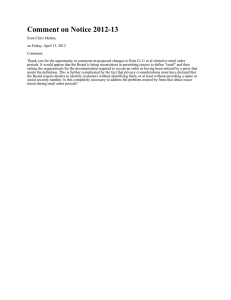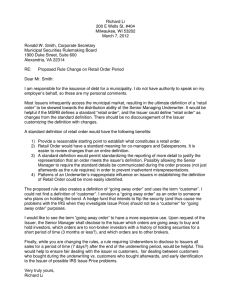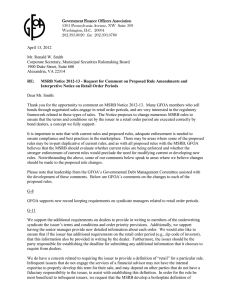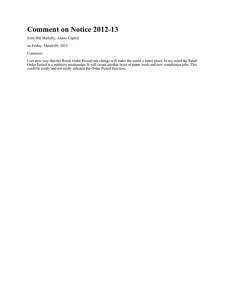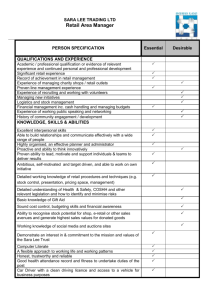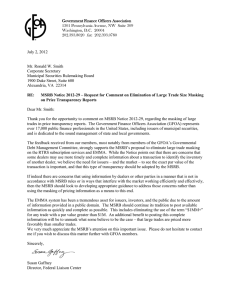Government Finance Officers Association 1301 Pennsylvania Avenue, NW Suite 309
advertisement
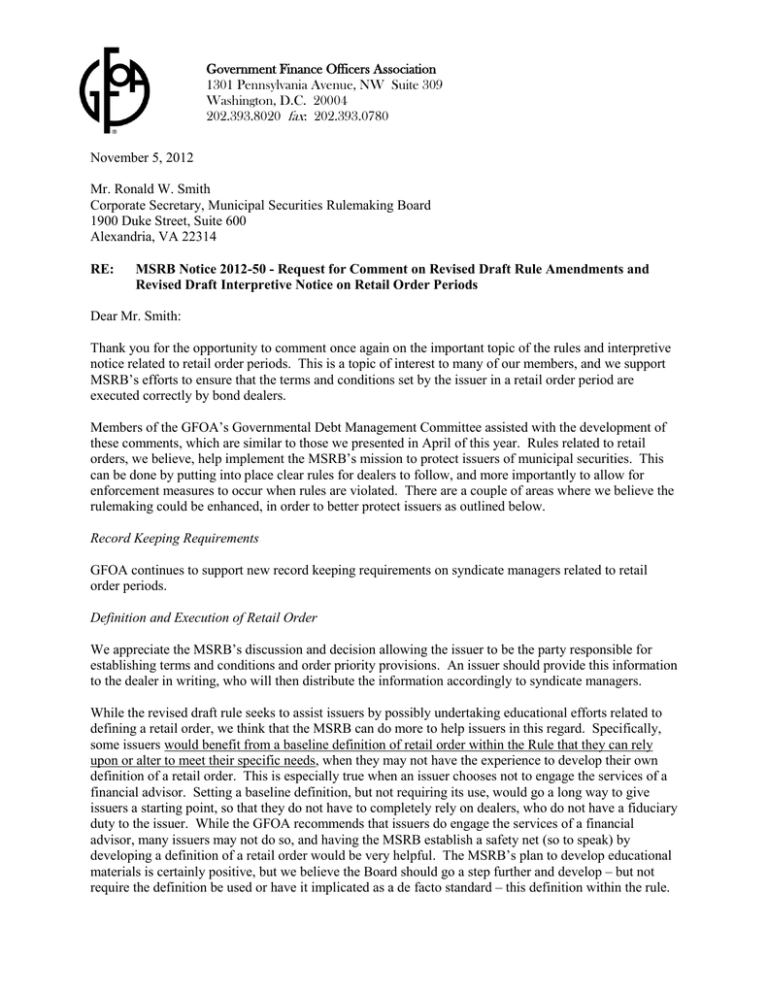
Government Finance Officers Association 1301 Pennsylvania Avenue, NW Suite 309 Washington, D.C. 20004 202.393.8020 fax: 202.393.0780 November 5, 2012 Mr. Ronald W. Smith Corporate Secretary, Municipal Securities Rulemaking Board 1900 Duke Street, Suite 600 Alexandria, VA 22314 RE: MSRB Notice 2012-50 - Request for Comment on Revised Draft Rule Amendments and Revised Draft Interpretive Notice on Retail Order Periods Dear Mr. Smith: Thank you for the opportunity to comment once again on the important topic of the rules and interpretive notice related to retail order periods. This is a topic of interest to many of our members, and we support MSRB’s efforts to ensure that the terms and conditions set by the issuer in a retail order period are executed correctly by bond dealers. Members of the GFOA’s Governmental Debt Management Committee assisted with the development of these comments, which are similar to those we presented in April of this year. Rules related to retail orders, we believe, help implement the MSRB’s mission to protect issuers of municipal securities. This can be done by putting into place clear rules for dealers to follow, and more importantly to allow for enforcement measures to occur when rules are violated. There are a couple of areas where we believe the rulemaking could be enhanced, in order to better protect issuers as outlined below. Record Keeping Requirements GFOA continues to support new record keeping requirements on syndicate managers related to retail order periods. Definition and Execution of Retail Order We appreciate the MSRB’s discussion and decision allowing the issuer to be the party responsible for establishing terms and conditions and order priority provisions. An issuer should provide this information to the dealer in writing, who will then distribute the information accordingly to syndicate managers. While the revised draft rule seeks to assist issuers by possibly undertaking educational efforts related to defining a retail order, we think that the MSRB can do more to help issuers in this regard. Specifically, some issuers would benefit from a baseline definition of retail order within the Rule that they can rely upon or alter to meet their specific needs, when they may not have the experience to develop their own definition of a retail order. This is especially true when an issuer chooses not to engage the services of a financial advisor. Setting a baseline definition, but not requiring its use, would go a long way to give issuers a starting point, so that they do not have to completely rely on dealers, who do not have a fiduciary duty to the issuer. While the GFOA recommends that issuers do engage the services of a financial advisor, many issuers may not do so, and having the MSRB establish a safety net (so to speak) by developing a definition of a retail order would be very helpful. The MSRB’s plan to develop educational materials is certainly positive, but we believe the Board should go a step further and develop – but not require the definition be used or have it implicated as a de facto standard – this definition within the rule. Fair Dealing We continue to support the proposed interpretation of Rule G-17, in order to ensure that dealers act fairly with issuers and their dealer colleagues. Fair Pricing Many governments chose to hold a retail order period for a variety of reasons including the desire to allow their citizens to have the opportunity to purchase bonds first hand, rather than in the secondary market – where the bonds are likely to be more expensive. It is therefore important that the MSRB should not engage in any rulemaking that would discourage governments from holding a retail order period. As we commented in April, changes to Rule G-30, related to fair pricing practices, continue to be of concern to our members. Fair pricing standards are important in this arena as in all others, yet the proposed changes could interfere with current retail order practices. The revised interpretative release correctly notes that there are various reasons why bonds may price differently during a retail order period than they do during an institutional order period. This is especially the case as the Notice states that pricing differences may result from different market conditions. The proposed changes suggest that the underwriter may be failing its fair pricing duty to retail customers unless the pricing differences may result from different market conditions, particularly in the case of retail orders submitted one or two days prior to the institutional order period. However, it is unclear – and we would argue it would always be fluid – as to the interpretation of how different market conditions may affect the pricing of the two types of sales, and what would constitute a significant difference between the price paid by the retail investor and the price paid by the institutional investor. We again ask the MSRB to recognize that there are various reasons why there may be pricing differences between the retail order period and the sale to institutional investors, that the reason for some price differences may not be in the control of the issuer or the underwriter, and that the application of fair pricing rules need to be carefully considered and exercised in this area. We therefore urge the MSRB to expressly state that price differences between the retail order period day and the later institutional order day do not per se create an assumption of lack of fair dealing, for the reasons stated in the letter. Forms We again support changes to the applicable forms as noted in the proposed changes to Rule G-32. Other Request for Comments We noted earlier that we especially concerned in cases where an issuer does not engage the services of a financial advisor, yet holds a retail order period and receives advise from a dealer whose judgment could be clouded due to their dual duties to deal fairly with both the issuer and the investor. It is because of this, that we encourage the MSRB to develop a baseline definition of retail order. Additionally, we think that the dealer should disclose any interests or motivations related to the assistance it provides the issuer when developing criteria for the retail order period. If the dealer does not believe that the criteria used by the issuer for a retail order period is not appropriate for the issuer, it should voice this opinion. The MSRB could also seek to establish some type of protocol or system so that the issuer can have some comfort that the retail orders – which could number in the hundreds –meet the preset criteria set by the issuer. In some cases it would be difficult for the issuer to be able to review such a large volume of orders, and therefore some type of system or procedures could be imposed on dealers to ensure compliance. Thank you again for the opportunity to comment on MSRB Notice 2012-50. Sincerely, Susan Gaffney Director, Federal Liaison Center 2
